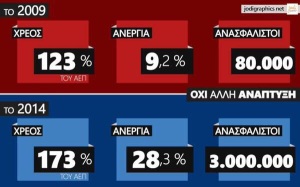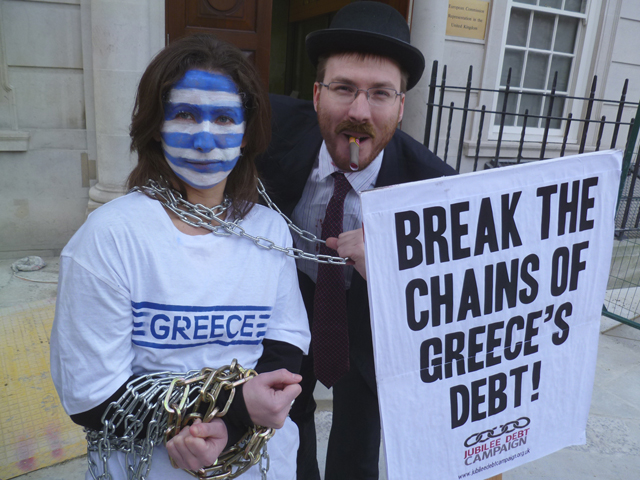
Μιχάλης Ψύλος
[...] Ανάλυση του Διεθνούς Νομισματικού Ταμείου που αποκαλύπτει η βρετανική οργάνωση Jubilee Debt Campaign αποδεικνύει ότι πάνω από το 90% των χρημάτων που δανείστηκε η Ελλάδα από το ΔΝΤ, τις ευρωπαϊκές κυβερνήσεις και την, Ευρωπαϊκή Κεντρική Τράπεζα, χρησιμοποιήθηκαν για τη σωτηρία των τραπεζών της Γαλλίας και της Γερμανίας και επιστράφηκαν στους δανειστές ,ενώ λιγότερο από το 10% εξυπηρέτησε πραγματικές ανάγκες του ελληνικού λαού.
Τα αριθμητικά στοιχεία περιλαμβάνονται στην έκθεση με τίτλο «Έξι βασικά στοιχεία για το χρέος της Ελλάδας και τις επικείμενες εκλογές »,που έδωσε στη δημοσιότητα η βρετανική οργάνωση την περασμένη Τρίτη .Όπως αναφέρεται στην έκθεση της βρετανικής οργάνωσης , «από το 2010, το ΔΝΤ, οι ευρωπαϊκές κυβερνήσεις και η Ευρωπαϊκή Κεντρική Τράπεζα έχουνι δανείσει στην Ελλάδα 252 δισεκατομμύρια ευρώ.Στην ίδια περίοδο, 232.9 δισεκατομμύρια δαπανήθηκαν για την αποπληρωμή του ελληνικού χρέους ,χωρίς να υπολογιστούν τα «δώρα» που δόθηκαν στους κερδοσκόπους ’για να αποδεχτούν την αναδιάρθρωση του χρέους με το περιβόητο PSI το 2012. Αυτό σημαίνει ότι λιγότερο από το 10% των δανείων χρησιμοποιήθηκαν για άλλους σκοπούς» .
Η Jubilee Debt Campaign αναφέρει επίσης : «Το 2010, σχεδόν όλο το χρέος του Ελληνικού Δημοσίου ήταν σε ιδιωτικούς φορείς, όπως οι τράπεζες. Σήμερα, το 78% έχει περάσει στον δημόσιο και θεσμικό τομέα, κυρίως στις χώρες της Ευρωζώνης, στον EFSF και στο ΔΝΤ». Αναλυτικότερα ,σήμερα το χρέος της Ελλάδας είναι ακόμη 317 δις.ευρώ εκ των οποίων τα 247,8 δισεκατομμύρια –το 78% - είναι στα χέρια της τροικας. «Ο συνδυασμός ήταν θανατηφόρος : Η ελληνική οικονομία συνετρίβη και το δημόσιο χρέος αυξήθηκε από 133% του ΑΕΠ το 2010 σε πάνω από 174% σήμερα» αναφέρει η έκθεση.
Όπως λέει ο Τίμ Τζόουνς, οικονομολόγος της βρετανικής οργάνωσης «οι ευρωπαϊκές και ελληνικές τράπεζες διασώθηκαν, ενώ το χρέος έμεινε στον ελληνικό λαό. Αυτό ήταν το αποτέλεσμα μιας άδικης αντιμετώπισης μιας οικονομικής κρίσης, όπως συνέβη σε πολλά μέρη του αναπτυσσόμενου κόσμου στη δεκαετία του 1980 και του 1990. Το χρέος πρέπει να διαγραφεί. Χρειαζόμαστε μια νέα διαδικασία για την αντιμετώπιση των κρίσεων χρέους, έτσι ώστε οι δανειστές να μην εξακολουθήσουν να σώζονται, αφήνοντας το κόστος στους λαούς»[...]
ΠΗΓΗ: olympia.gr
---------------------
At least 90% of the Greek bailout has paid off reckless lenders
New analysis of IMF figures, released by the Jubilee Debt Campaign, show that almost all of the money lent by the IMF, European governments and the European Central Bank to Greece has been used to pay off reckless lenders, with less than 10% of it reaching the Greek people.
Since 2010, the IMF, European governments and the European Central Bank have lent €252 billion to Greece. Over the same period, €232.9 billion has been spent on debt payments, bailing out Greek banks and paying ‘sweeteners’ to speculators to get them to accept the 2012 debt restructuring. This means less than 10% of the money has been used for anything else.
In 2010, virtually all Greek government debt was owed to private entities such as banks. Today 78% is owed to the public sector, primarily people in other Eurozone countries, but also throughout the world through the IMF’s loans.
Tim Jones, economist at the Jubilee Debt Campaign said:
“European and Greek banks have been bailed out, whilst a debt has been left with the Greek people. This is the same unjust response to a financial crisis as happened across much of the developing world in the 1980s and 1990s. Debt needs to be cancelled, and we need a new process for dealing with debt crises so that lenders do not continue to be bailed out, leaving the cost with the public, and incentivising more reckless lending and turmoil.”
The figures are included in a new ‘Six key facts about Greek debt briefing’ released by the Jubilee Debt C
ampaign ahead of the Greek elections on 25 January.
Syriza, who are leading in the polls, are proposing a conference to agree cancellation of debt to reduce it to a fair level. This is along the lines of the London conference in 1953, which agreed to cancel half of Germany’s debt, and make repayments on the other half contingent on Germany making enough money from trade with the rest of the world to be able to pay them.
The combination of the crashing of the economy and the bailout loans means Greek government debt has grown from 133% of GDP in 2010 to 174% today.
The six key facts briefing is available here
The Jubilee Debt Campaign’s briefing on the precedent of the London conference in 1953 is available here
New analysis of IMF figures, released by the Jubilee Debt Campaign, show that almost all of the money lent by the IMF, European governments and the European Central Bank to Greece has been used to pay off reckless lenders, with less than 10% of it reaching the Greek people.
Since 2010, the IMF, European governments and the European Central Bank have lent €252 billion to Greece. Over the same period, €232.9 billion has been spent on debt payments, bailing out Greek banks and paying ‘sweeteners’ to speculators to get them to accept the 2012 debt restructuring. This means less than 10% of the money has been used for anything else.
In 2010, virtually all Greek government debt was owed to private entities such as banks. Today 78% is owed to the public sector, primarily people in other Eurozone countries, but also throughout the world through the IMF’s loans.
Tim Jones, economist at the Jubilee Debt Campaign said:
“European and Greek banks have been bailed out, whilst a debt has been left with the Greek people. This is the same unjust response to a financial crisis as happened across much of the developing world in the 1980s and 1990s. Debt needs to be cancelled, and we need a new process for dealing with debt crises so that lenders do not continue to be bailed out, leaving the cost with the public, and incentivising more reckless lending and turmoil.”
The figures are included in a new ‘Six key facts about Greek debt briefing’ released by the Jubilee Debt C
ampaign ahead of the Greek elections on 25 January.
ampaign ahead of the Greek elections on 25 January.
Syriza, who are leading in the polls, are proposing a conference to agree cancellation of debt to reduce it to a fair level. This is along the lines of the London conference in 1953, which agreed to cancel half of Germany’s debt, and make repayments on the other half contingent on Germany making enough money from trade with the rest of the world to be able to pay them.
The combination of the crashing of the economy and the bailout loans means Greek government debt has grown from 133% of GDP in 2010 to 174% today.
The six key facts briefing is available here
The Jubilee Debt Campaign’s briefing on the precedent of the London conference in 1953 is available here
Σχετικά με τον συντάκτη της ανάρτησης:
Η ιστοσελίδα μας δημιουργήθηκε το 2008.Δείτε τους συντελεστές και την ταυτότητα της προσπάθειας. Επικοινωνήστε μαζί μας εδώ .








κανένα σχόλιο